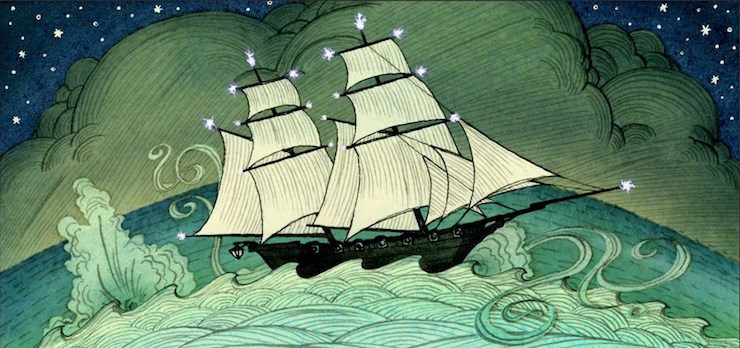Once upon a time (cough, August 6, 2013, actually), Tor.com published “I Hate Boats,” by Carl Engle-Laird. Carl’s gone on to brilliant things, but I still want to argue with him about the post, and especially this sentence in particular: “Whenever my beloved protagonists get on a boat, I groan, put the book on the table, and pace around the room muttering angrily to myself, alarming friends and loved ones.”
Carl, now that you’re a big-deal editor at Tor.com, I’m finally ready to tell you that I feel exactly the opposite way. I love boats, and when I see one in a book, I feel a lot of hope. I grew up sailing on the Chesapeake Bay, reading nautical histories, and what I want in my fiction is a boat that feels real and suits the plot. When a book takes me over water, I’m eagerly looking for the most seaworthy craft.
Such boats do exist! I am pretty sure we agree on this, because when you said, “The sad thing is that I think stories about boats and sailors can be incredibly compelling. A vessel on the open sea is a full, totally enclosed world unto itself…,” I nodded enthusiastically. But you left your readers a warning, “Don’t just treat your sea voyage as an opportunity to have things happen to your helpless protagonists, who don’t know any more about how to sail than you do. If you do, the only result will be wasted pages,” and I wanted you to know that they’re out there, those exciting boats you seek!
To prove it, I made a list of my favorites. This list is a relatively short one for me, in part because I don’t fall in love with many literary boats, magical or otherwise, for the same reasons you cite. I am, however, a collector of favorite hulls—even those that get only a chapter or a small mention in a much larger story, when they are written well and become their own enclosed world for a moment.
To gain a berth on the list, a boat must first and foremost feel like a boat. It must not be any other conveyance or structure in disguise. Boats behave differently than, say, Inns or Carriages, for instance. The very physics of a boat is different from everything else. The boat must travel over water (with apologies to the lovely spacefaring Diana, the ship in Arabella of Mars by David Levine, and many others). And it must be a sailing ship. That’s personal preference. (I have nothing against motorboats. I just don’t like them.)
So here are nine hulls that number very high among my favorites. Carl, perhaps we can revisit the boat-hate sometime? And for the rest of you, what are your favorites?
Lookfar (aka Sanderling)
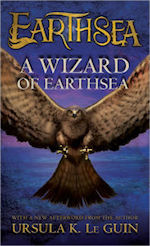 Lookfar was my first boat made of paper and words, and my best-beloved, because of the exchange that happens when Lookfar is re-named: “… do you call her Lookfar, and paint eyes aside her prow, and my thanks will look out of that blind wood for you and keep you from rock and reef. For I had forgotten how much light there is in the world, till you gave it back to me.” The brown/red sailed clinker isn’t as fancy as Sea Otter, Dolphin, or Shadow (an archipelago trilogy requires many boats), but it gets the mage Ged where he needs to go in Le Guin’s Earthsea Trilogy.
Lookfar was my first boat made of paper and words, and my best-beloved, because of the exchange that happens when Lookfar is re-named: “… do you call her Lookfar, and paint eyes aside her prow, and my thanks will look out of that blind wood for you and keep you from rock and reef. For I had forgotten how much light there is in the world, till you gave it back to me.” The brown/red sailed clinker isn’t as fancy as Sea Otter, Dolphin, or Shadow (an archipelago trilogy requires many boats), but it gets the mage Ged where he needs to go in Le Guin’s Earthsea Trilogy.
Nightjar
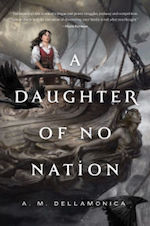 There are many ships in Stormwrack, but this one is mine. “Nightjar was a seventy-two-foot cutter with a crew of twenty-five. It had been enchanted so that it was ever-so-slightly inconspicuous, easily overlooked by casual observers.” Created by A.M. Dellamonica, Nightjar is among the first of a fleet of enchanted ships in a portal universe, beginning in A Daughter of No Nation.
There are many ships in Stormwrack, but this one is mine. “Nightjar was a seventy-two-foot cutter with a crew of twenty-five. It had been enchanted so that it was ever-so-slightly inconspicuous, easily overlooked by casual observers.” Created by A.M. Dellamonica, Nightjar is among the first of a fleet of enchanted ships in a portal universe, beginning in A Daughter of No Nation.
Vivacia
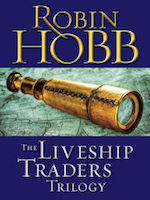 Among of the liveships created by Robin Hobb (The Liveship Traders series, 1998-2012), the Vivacia captured my imagination first. Crafted from wizardwood and sentient, Vivacia is a standout craft with Opinions. (For the record, The Paragon also commands my readerly attention.) Hobb’s liveships are compelling characters as well as ships.
Among of the liveships created by Robin Hobb (The Liveship Traders series, 1998-2012), the Vivacia captured my imagination first. Crafted from wizardwood and sentient, Vivacia is a standout craft with Opinions. (For the record, The Paragon also commands my readerly attention.) Hobb’s liveships are compelling characters as well as ships.
The Giggling Goat
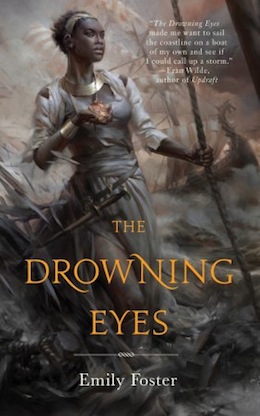 Emily Foster’s weather-mage beset ship and its stalwart captain in the novella The Drowning Eyes [Editor’s note: acquired by one Carl Engle-Laid for Tor.com Publishing…] handle wind shifts and storm tides equally well. The Goat’s deck and gunwales are a fantastic setting within which its characters interact, but it’s also an excellent vehicle for the plot. (I also love the map in this book, too, but that’s for another post).
Emily Foster’s weather-mage beset ship and its stalwart captain in the novella The Drowning Eyes [Editor’s note: acquired by one Carl Engle-Laid for Tor.com Publishing…] handle wind shifts and storm tides equally well. The Goat’s deck and gunwales are a fantastic setting within which its characters interact, but it’s also an excellent vehicle for the plot. (I also love the map in this book, too, but that’s for another post).
HMS Surprise
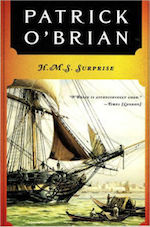 Patrick O’Brian’s own creation, titular novel and frigate both. Yes, I know this is nautical fiction, not fantasy. It is still the shiniest boat, and a beautifully rendered world unto itself. HMS Hotspur is also a gorgeous sloop, crafted by C.S. Forester. (Look, Carl, it is not every day that a sloop gets a fancy position in a movie and I am a sucker for sloops and this has NOTHING to do with Ioan Gruffudd being really impressive as Horatio Hornblower. Not a thing.)
Patrick O’Brian’s own creation, titular novel and frigate both. Yes, I know this is nautical fiction, not fantasy. It is still the shiniest boat, and a beautifully rendered world unto itself. HMS Hotspur is also a gorgeous sloop, crafted by C.S. Forester. (Look, Carl, it is not every day that a sloop gets a fancy position in a movie and I am a sucker for sloops and this has NOTHING to do with Ioan Gruffudd being really impressive as Horatio Hornblower. Not a thing.)
Clalsu
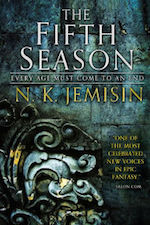 “Its sails are tawny canvas, also much-mended and sun-faded and water marked.” Though readers spend only a very short time aboard the Clalsu, after just a moment we realize we’re sailing with people—especially Captain Meov—who really know what they’re doing. Best of all, this boat reacts to the behavior of those aboard in a way that is much different from land because the author rocked it. Thank you, N.K. Jemisin, thank you from the bottom of my heart for writing good boat physics in The Fifth Season.
“Its sails are tawny canvas, also much-mended and sun-faded and water marked.” Though readers spend only a very short time aboard the Clalsu, after just a moment we realize we’re sailing with people—especially Captain Meov—who really know what they’re doing. Best of all, this boat reacts to the behavior of those aboard in a way that is much different from land because the author rocked it. Thank you, N.K. Jemisin, thank you from the bottom of my heart for writing good boat physics in The Fifth Season.
The Poison Orchid
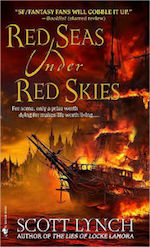 Captained by Zamira Drakasha and drafted by Scott Lynch in Red Seas Under Red Skies, the Orchid is my favorite pirate ship in part because it’s got all its working bits and is an actual working ship (a brig, actually…) You can practically hear it creak as it comes about. (To be fair, Carl did include The Poison Orchid as a good example of boat writing in his “I Hate Boats” post, too.)
Captained by Zamira Drakasha and drafted by Scott Lynch in Red Seas Under Red Skies, the Orchid is my favorite pirate ship in part because it’s got all its working bits and is an actual working ship (a brig, actually…) You can practically hear it creak as it comes about. (To be fair, Carl did include The Poison Orchid as a good example of boat writing in his “I Hate Boats” post, too.)
The Left-Handed Fate
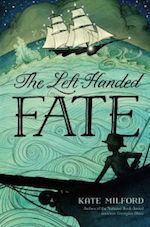 A privateer ship that has its home port in the magical Nagspeake, the Fate carries Lucy Bluecrowne and her friends Max and Liao through the troubled waters of the War of 1812. While sailing up and down the Chesapeake, the Fate calls at my own former home port of Fells Point, Maryland, further endearing it to me. Author Kate Milford has created a wonderful set of ships and ports for this middle grade book, The Left-Handed Fate.
A privateer ship that has its home port in the magical Nagspeake, the Fate carries Lucy Bluecrowne and her friends Max and Liao through the troubled waters of the War of 1812. While sailing up and down the Chesapeake, the Fate calls at my own former home port of Fells Point, Maryland, further endearing it to me. Author Kate Milford has created a wonderful set of ships and ports for this middle grade book, The Left-Handed Fate.
Fran Wilde taught sailing on the Chesapeake Bay and can still tie a one-handed bowline. She is the author of the Andre Norton-, and Compton Crook Award-winning and Nebula-nominated novel Updraft (Tor 2015), its sequel, Cloudbound, publishing from Tor in September 2016, and the novella The Jewel and Her Lapidary (Tor.com Publishing). Her short stories appear in Asimov’s, Tor.com, Beneath Ceaseless Skies, and Nature. She writes for publications including The Washington Post, Tor.com, Clarkesworld, iO9.com, and GeekMom.com. You can find her on twitter @fran_wilde, Facebook @franwildewrites and at franwilde.net.










